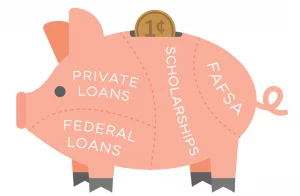The Free Application for Federal Student Aid, more widely recognized by its acronym “FAFSA”, is the key to unlocking federal financial aid that comes in the form of loans, grants (in this case, mostly need-based), work-study programs, and more. One of the most common questions I hear students and parents ask in relation to federal aid is “When is the FAFSA due?”
While this question does have a concrete answer, it also has a more nuanced one. So, in the spirit of making this as clear as possible, let’s start with the concrete one.


According to StudentAid.gov, the annual FAFSA deadline is June 30th of each academic year.
Essentially, June 30th is the very last day that you can have your forms submitted on the Student Aid website for any given year if you want to be considered for federal financial aid.
My tip? Start your FAFSA earlier in the year, and aim to have it submitted within the first two months of the form becomes available. For reference, the FAFSA goes live on October 1st of each year.
The FAFSA form must be submitted by 11:59 p.m. CT on June 30, 2025. Any corrections or updates must be submitted by 11:59 p.m. CT on Sept. 14, 2025.
Each college may have its own deadline. Check with the college(s) you’re interested in attending. You may also want to ask your college about its definition of an application deadline. Is it the date your FAFSA form is processed or the date the college receives your processed FAFSA data?
Each state has its own deadline.
Now that you have the straightforward, last possible deadline to submit the FAFSA in your head (and hopefully in your calendar!), let’s discuss the more nuanced answer to the question: When is the FAFSA due?
When you submit the FAFSA, it doesn’t only get utilized by the federal government to help determine how much aid you’re eligible for.
Completing the FAFSA is also what allows you to be considered for state-based aid, as well as specific scholarships offered by each individual college and university that you’re applying to. Because of this, each state and each institution has its own specific deadline (before June 30) that the FAFSA needs to be completed by.
Some states have their FAFSA deadlines listed on the Student Aid website, whereas other states direct you to find the deadline information on the financial aid portion of your intended or current institution’s website.
Overall, most states indicate that you should try to get your FAFSA in and completed “ASAP after October 1st”.
The main reason why it is critical to have your FAFSA completed and submitted as close to October 1st as possible is that most states and institutions don’t have an unlimited amount of financial aid and scholarships to disperse.
In most cases, this aid is given out on a first-come, first-serve basis, so, by filing your FAFSA as early as you can, you are giving yourself the best chance at receiving the financial aid that you’re eligible for, based on your EFC, merit, and other factors.
Expected Family Contribution (EFC) is the number calculated with information from the FAFSA used to determine a student's eligibility for financial aid.
Note: Your EFC is not the amount of money your family will have to pay for college, nor is it the amount of federal student aid you will receive. It is a number that schools use to calculate the amount of federal student aid you are eligible to receive.
Gather Your Basic Personal Information
Expect to provide personal information such as your name, date of birth, address, and social security number. Depending on whether or not you’re a U.S. citizen or tax returns filed, you may need to provide additional information. Either way, have the following information ready when you begin filling out your application:
In addition to the aid that you can possibly receive by filing the FAFSA, there are a few other potential sources of financial aid that are definitely worth exploring, including private scholarships and even private student loans.
If you’re looking for some easy places to start with searching for private scholarships, check out some of my popular posts, like Scholarships for High School Juniors, Scholarships for High School Seniors, No-Essay Scholarships, STEM Scholarships, Full-Ride Scholarships, or Scholarships for Minorities.
There are dozens of more posts like these on my blog, so if it’s free money you’re wanting, don’t hesitate to check them out.
While the words “private loans” tend to be frowned upon and viewed as a last resort in paying for college space, this doesn’t mean that there aren’t viable options out there to be explored. If you have exhausted all of your federal student loan options, organizations like Ascent Funding and MPower offer private loans that are geared towards students. If you have graduated, be sure to check out the best student loan refinance companies.